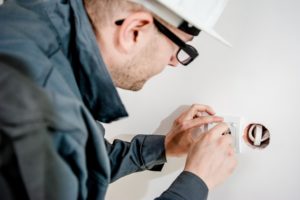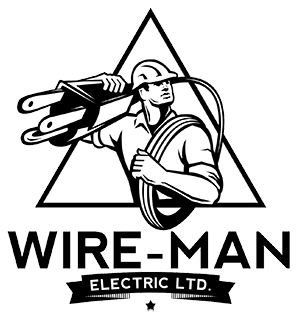
Electrical Safety is Important
Since all of us use electrical power in our homes, we need to practice electrical safety. The cost to human life and property is too great a risk to ignore. Wireman Electric cares about the safety of our customers. We want to provide you with some basic safety tips to protect yourself and your family.
It is always a good idea to consult with a professional to identify problems, they know what to look for from power supplies, plugs, cords, and lighting fixtures to lamps and appliances.
You can also examine how emerging technology can provide energy resilience to homes and businesses.
Tips on Possible Hazards in the Home
Much can be avoided by simply following some basic electricity safety tips. Here is a simple checklist to follow. If any of these areas raise questions about their safety and their efficiency and effectiveness, ask us.
Here are eight of the most critical potential electrical hazards:
- Extension Cords: Extension cords can be hazardous not only if they are in poor condition, but also simply because they can be tripped on if not positioned and affixed properly. Although using the correct extension cord for the environment and application, will help to extend the life of the cord, they are meant to be periodically replaced. Avoid attempting to repair extension cords, instead replace them.
- Wet Hands: Any electrical component or appliance should never be handled with wet hands. For this reason, electrical switches and outlets next to a sink should be avoided. In this situation, the odds of you having wet hands while in the proximity of electricity increases dramatically. Keep all electrical appliances and sources away from showers, bathtubs, and sinks.
- Young Children: When a child is very young, everything is new and needs to be explored. It is best to keep an eye on curious children. There are also things you can do ahead of time, if you are expecting a child, that keeps them safe, like covering accessible outlets, and preventing them from sticking anything into the socket.
- Using Water on Electrical Fires: Never use water to attempt to dowse an electrical fire. Water actually fuels electrical fires. If you are concerned about the possibility of such a fire, use an extinguisher instead of water.
- Covered Cords and Wires: Covering cords and wires can cause them to overheat. Although rare, heated wires can sometimes lead to electrical fires. Since cords and wires radiate heat, it is better to play it safe and keep them clear of other items and keep them uncovered.
- Lightbulbs: Lightbulbs aren’t usually considered to be electrical hazards, they are not, in themselves, typically dangerous. However, when hot lightbulbs are near flammable objects, like paper, bed linens, drapes, or upholstery there is a fire risk.
- Outlets Near Water: Kitchens, bathrooms, or laundry rooms should always have their electrical outlets installed a safe distance away from sources of water. Water is an electrical conductor. Keeping electrical sources and water at a safe distance from each other reduces the chance of shock.
- Damaged or Defective Wires: To avoid the chance of fires, power surges, or sparking, a quality wiring job conforms to rigid safety standards. For this reason, electrical work should be done by a professional and it is best to avoid doing it yourself. A qualified electrician can regularly check your wiring to make sure it is safe and undamaged, giving you the chance to replace faulty wiring that can be a hazard.
Choose Wire-man Electric for all your Electrical Work
By contacting Wire-Man Electric, you stay safe and in good operating order. Our experienced electricians serve Greater Vancouver, and we extend our services to Vancouver Island. Contact Wireman Electric and get a free quote.
